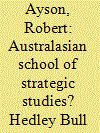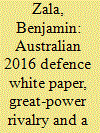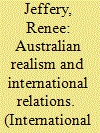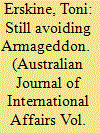|
|
|
Sort Order |
|
|
|
Items / Page
|
|
|
|
|
|
|
| Srl | Item |
| 1 |
ID:
101830


|
|
|
|
|
| Publication |
2011.
|
| Summary/Abstract |
To the extent that there is a distinctively Australasian school of strategic studies it is to be found in the work of Hedley Bull, a scholar who is more widely noted for his work as an international relations theorist. Bull's lesser known but influential contributions to strategic studies dealt with the management of nuclear weapons in international strategic relationships and the management of great power relations in the Asia-Pacific region. His work in these areas, while less well known than some of his other writings, deserves contemporary attention as strategic change in Asia increasingly shapes the international strategic picture, thereby creating the opportunity for Australasian strategic analysts to influence the global debate.
|
|
|
|
|
|
|
|
|
|
|
|
|
|
|
|
| 2 |
ID:
146521


|
|
|
|
|
| Summary/Abstract |
This piece is an imagined email correspondence between three renowned international relations scholars, E. H. Carr, Hedley Bull and Coral Bell, who are discussing the Australian 2016 Defence White Paper. The purpose of such an exercise is to reflect on the ‘big-picture’ international relations questions posed by what might otherwise be thought of as a relatively technical defence policy document. In particular, the correspondence between the three focuses on the central importance of the White Paper’s assumptions of a ‘rules-based global order’ and the relationship between this order and US power. In their time, all three authors spoke directly to questions of power, law and order in their scholarly work, which had been deeply influenced, in all three cases, by periods spent working at the ‘coalface’ of these issues in government in Britain and Australia. As such, Carr, Bull and Bell have much to say about how Australia is positioning itself for a post-unipolar world.
|
|
|
|
|
|
|
|
|
|
|
|
|
|
|
|
| 3 |
ID:
086296


|
|
|
|
|
| Publication |
2008.
|
| Summary/Abstract |
John Anderson, Professor of Philosophy at the University of Sydney from 1927 to 1958, is not conventionally viewed as having exerted a significant influence on the development of international relations in the 20th century. Indeed, his contributions to philosophical realism and public debate in Australian society have been more readily acknowledged as his major spheres of influence. However, Anderson must also be credited with having exerted a significant influence on the intellectual development of one of the most prominent international relations theorists of the 20th century, his student Hedley Bull. With this in mind, this article assesses the impact of Anderson's teachings on Bull's thought and argues that although Bull deviated from his earliest mentor's more extreme views about ethical inquiry, his general approach to the study of international relations, understanding of international society, and sceptical attitude towards religion can, in large part, be derived from Anderson's teachings.
|
|
|
|
|
|
|
|
|
|
|
|
|
|
|
|
| 4 |
ID:
183508


|
|
|
|
|
| Summary/Abstract |
Frequently inspired by the spectre of existential risk, Australian IR scholars have made – and continue to make – a crucial contribution to the evolution of normative IR theory. In defending this position, this article takes three steps. First, it outlines key catalysts that prompted the emergence of this sub-field as a distinct and self-aware area of study approximately forty years ago and refines the story of its genesis by recognising pioneering Australian contributions. Second, it turns to the previous generation of Australian IR to explore the work of two prominent scholars – and ‘neglected antecedents’ – who both prefigured and helped to establish the intellectual context for normative IR theory. Specifically, it focuses on the scholarship of Coral Bell and Hedley Bull and maintains that the classical approach and interpretive methodology that their work exemplified and fostered was particularly conducive to the subsequent development of a sub-field focused on questions of international ethics. Finally, this article contemplates the future of normative IR theory in Australia by highlighting its current flourishing, acknowledging the seemingly intractable practical challenges that it must address, and proposing that it might better confront them by turning to a hitherto overlooked Australian ethical perspective.
|
|
|
|
|
|
|
|
|
|
|
|
|
|
|
|
|
|
|
|
|